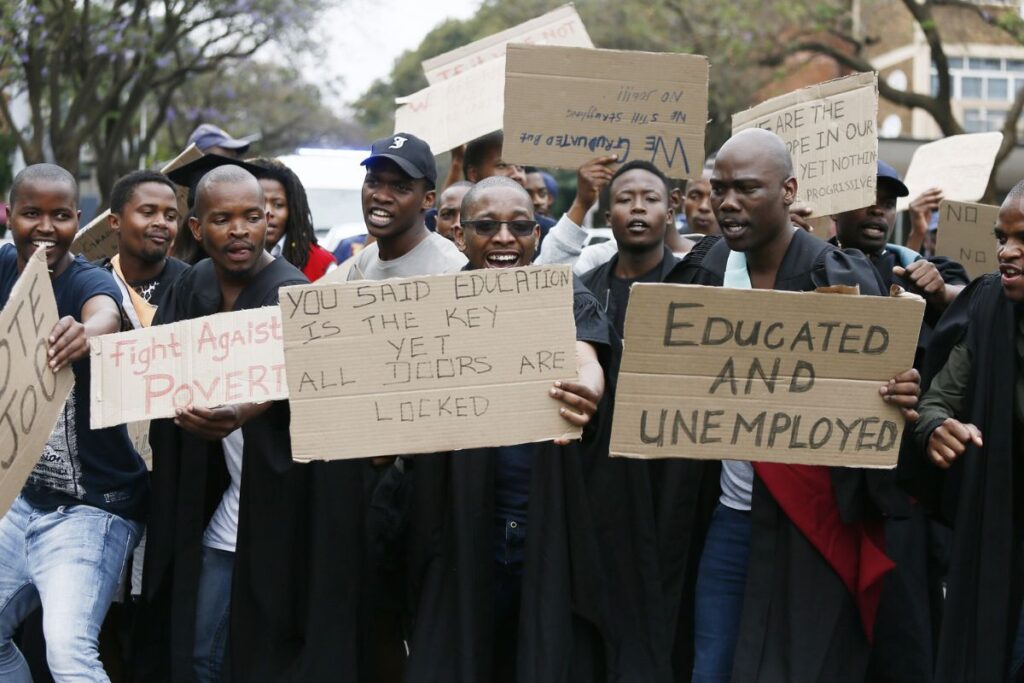Statistics South Africa (StatsSA) 2023 reports that in the third quarter, the youth unemployment rate in South Africa was 41.2% (expanded definition). Youth unemployment (15-34 years) is 43.4% or 4.6 million. The Department of Higher Education and Training (DHET) 2023 reports that 53.2% of the youth (15-34 years) in the third quarter of 2022 were not in employment, education, or training (NEET).
We do not need a downsized government as neoliberals suggest; we need “managed capitalism” or a Keynesian economic strategy. Keynesianism prescribes that to stimulate economic growth, there must be an increase in aggregate demand; this is achieved by increasing government spending and cutting taxes (expansionary fiscal policy) to reduce unemployment considerably.
Political-economic problems that compound youth unemployment rate in South Africa
Rationalisation and consolidation of the public sector and organisational restructuring in the private sector depletes jobs in the hundreds of thousands. This is a by-product of the Growth Employment and Redistribution Strategy (GEAR) 1996, construed mainly as a self-imposed Structural Adjustment Programme (SAP).
Another problem is inept governance and unrepentant corruption in the public sector, particularly in local government and State-Owned Enterprises (SOEs). This became glaringly evident in the State of Capture Commission Report released in 2022.
The failure of Eskom causes loadshedding or power blackouts. A failure caused by syndicates doing their best to sabotage the SOE through an array of tactics, including the supply of low-quality coal, and rampant corruption, which incorporates politically connected service providers who, in turn, grease the palms of the governing party.
Financialisation is a preponderance of liquid assets (speculative investment or gambling on the stock market); this corresponds with a decline in the economy’s productive investment (property, plant, and equipment). Productive investment develops infrastructure and creates sustainable jobs. Automation, mainly in the banking and retail sectors, renders human resources obsolete and emphasises investment in technology instead.

Tied to the above is the relaxation of labour laws, which is responsible for the rise of insecure, short-term, and poorly-paying employment. The surge in precarious jobs is evident in both the public and private sectors and became acute, especially after the Covid-19 pandemic hit in 2020.
The above occurs because of political timidity by the governing elite and a lack of decisive labour market regulation by the government – policy failure.
The anti-labour absorption behaviour of enterprises, companies, or firms also characterises a demand-side failure.
Supply-side failure speaks to Technical Vocational Education Training (TVET) and Universities shortage of supply of the skillset required by enterprises, companies, or firms (the economy) that employ 73.3% of the labour force (Commission for Employment Equity [CEE] 2022/23 Annual Report).
The structure of the economy, characterised by a minerals-energy complex (economic dominance by mining, energy generation, finance, and agriculture), needs to be more accommodating to the demand for employment in the country.
The policy architecture in the democratic period has not meaningfully changed to positively impact the economy’s structure so that necessary employment is created.
The Covid-19 pandemic and its necessary regulations decimated South Africa’s dual economy, contributing to job losses in the millions. Particularly hit were informal sector traders and those in precarious employment, principally black women from townships, informal settlements, and rural areas.
Mixed policy approach recommendations
The services, retail, and financial sectors cannot provide meaningful, gainful employment in sufficient quantity because the tertiary sector is not designed to create massive employment. This can only be achieved by a secondary sector dominated by manufacturing, construction, mechanical production, and mineral beneficiation.
This approach – the dominance of the secondary sector – has worked in many parts of the world, particularly in The People’s Republic of China. This necessitates quite an extensive role for the government in employment creation through demand-side policies in line with South Africa’s aspirations for developmentalism, as echoed by the National Development Plan of 2012 (Vision 2030).
Simply put, the developmental state acts as an economic investment agent, acting on behalf of the public interest. The developmental state does not wait for the private sector to create jobs; it assumes responsibility through civil and public service jobs, political jobs in state organs, SOEs, and public-private partnerships (PPP).
Furthermore, the state leads economic development and is not only a distributor of social welfare. The South African government has the political-economic ammunition to create sufficient and sustainable employment to redistribute income and reduce inequality (0.67 Ginni-coefficient) through increased public spending.

The Keynesian economic model ensures a considerable increase in public spending and business investment.
The government should leverage outsourcing by directing high-value tenders to a patriotic private sector that reinvests productively in the domestic economy and voluntarily undertakes impactful corporate social responsibility and investment (CSR/I), working closely with civil society organisations, and local communities.
The production and distribution of civil servants’ uniforms and government department furniture must be controlled by a patriotic private sector partnering with public entities. In this way, the government can, through legislation, ensure that TVET and university graduates are absorbed in these partnerships and public revenue increases, allowing further public expenditure.
So, government tenders would be directed to a patriotic private sector that makes domestic productive investments and actively combats unemployment and under-development through CSI and PPPs.
Of Equal importance is a government that will rigorously enforce a system of rewarding good performance (excellent work ethic and ingenuity) in the civil service or public administration. A commitment to improving the administrative system to meet and surpass world-class standards by transforming the organisational culture, centring it on moral rather than material interest.
The government must be decisive about industry regulation and eliminate labour precarity by empowering trade unions.
Greater coordination must be fostered between TVETs, universities, industry bodies, and employers.
It must be acknowledged unambiguously that all these proposals are wishful thinking without a capable, ethical, clean, efficient, and accountable government.
Mbasa Mvenene is a PhD candidate at Nelson Mandela University (political studies) and teaches political studies at Walter Sisulu University. He writes in his personal capacity.























